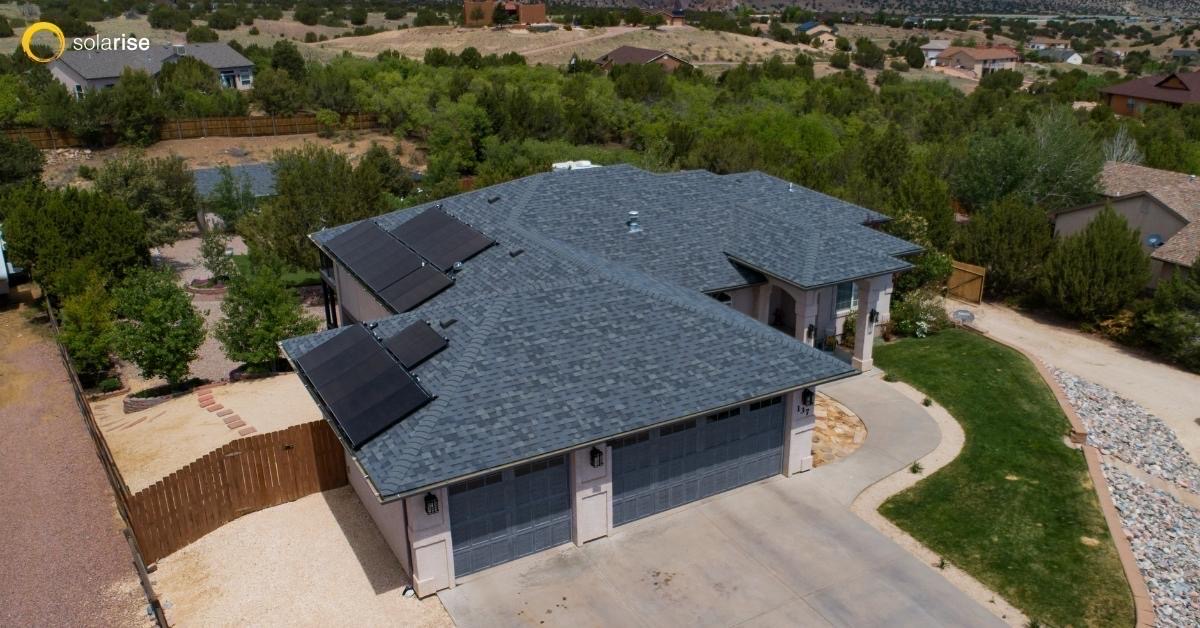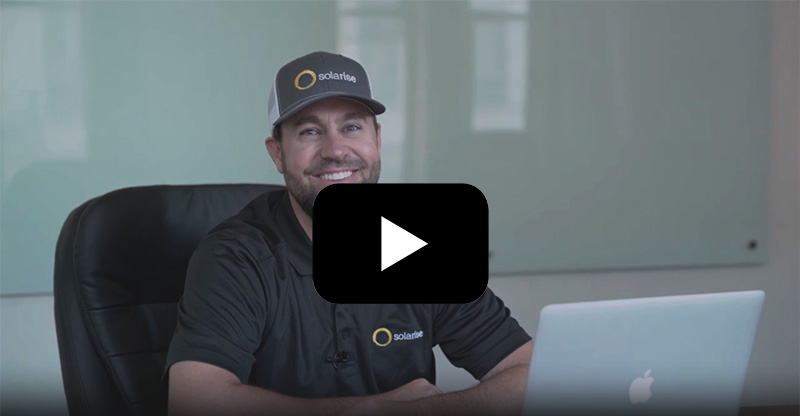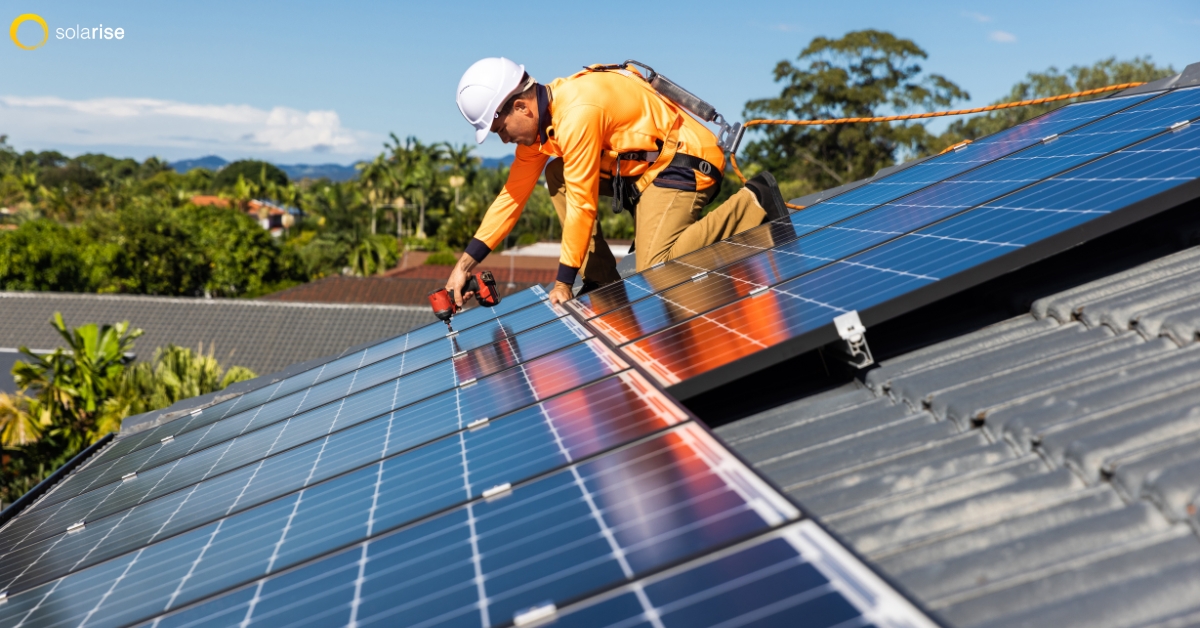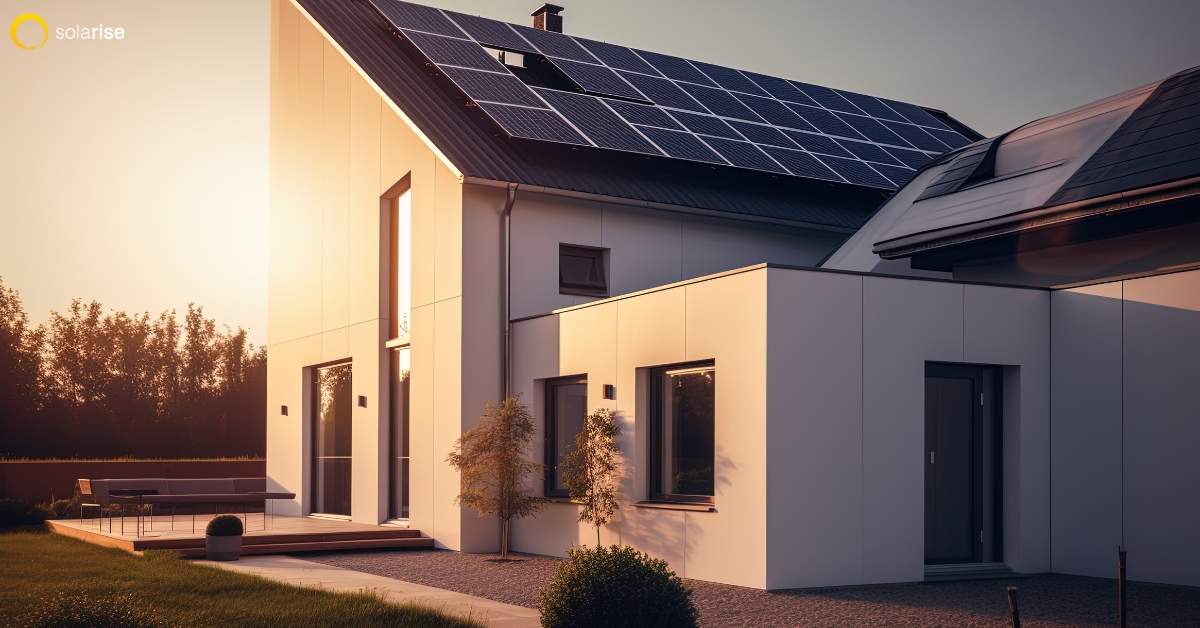Keeping solar panels clean is important and simple to do. The U.S. Department of Energy advises that cleaning solar panels can significantly increase the amount of the sun’s energy they can collect. The good news is that you don’t need a solar panel maintenance checklist. There are only a few essentials you need to know about how to clean and maintain solar panels and you can easily take care of these on your own without any outside help.
Table of Contents
Click to jump to section:
- How Often Should I Clean My Solar Panels?
- What You Need for Cleaning Solar Panels
- Before Cleaning Solar Panels
- How to Clean Solar Panels
- Solar Panel Maintenance
- #1 Solar Panel Installation Company
How Often Should I Clean My Solar Panels?
Having an official solar panel maintenance schedule is not necessary because there's nothing you'll need to maintain other than an occasional light cleaning. The most efficient plan is simply to clean the panels as needed. How often you will need to clean your solar panels depends on your climate region and the specific area you live in. Generally late spring or during the summer is recommended after pollen has settled.
Additionally, check your solar power monitoring system routinely. It will indicate when your panels are underperforming. If you notice a decrease in power output from your solar panels, the first thing to check is the cleanliness of the panel surfaces to see if they need cleaning.
Supplies Needed for Solar Panel Cleaning
You may already have all the items you need to do a good job cleaning your solar panels. Or, you can buy a solar panel cleaning kit that includes everything you'll need:
- Container filled with soapy water
- Water hose with a spray nozzle
- Small soft cleaning brush
- Small soft cleaning brush with a long handle
- Squeegee or a window cleaning cloth on a handle
What you'll find in stores in the general cleaning products aisle is just as good as what you can expect to buy in a solar panel cleaning kit.
Before Cleaning Solar Panels
Here are a few things you need to do before you begin cleaning your solar panels:
- Follow Manufacturer's Instructions: Check with your manufacturer to see if there are any specific instructions required for cleaning or maintaining your particular solar panels.
- Clean Cool Panel Surfaces: Choose a day with cool temperatures or early morning hours for cleaning solar panels because they can heat fast in direct sunlight.
- Do Not Step on Solar Panels: Stepping or standing on solar panels can cause damage to the panels. For panels that are too hard to reach, you may need a professional to do the cleaning.
- Make Safety Your Top Priority: Use a cleaning tool with a long handle instead of climbing to reach higher spots on the solar panels. If your roof is steeply pitched or is higher than one story, or has fragile wood shakes or tiles, consider hiring a professional to clean your solar panels.
How to Clean Solar Panels
Solar panels are made of highly durable tempered glass, and they don't have any moving parts. So, they don't require much maintenance, except occasional cleaning. Dirty solar panels are much less productive in collecting energy from the sun. Research indicates that clean solar panels are up to 25 percent more effective than dirty ones.
Determine whether your solar panels need to be cleaned.
If the solar panels look very dirty or your solar output monitoring system indicates they are under-producing even though it's sunny outside, it's probably time to clean the panels.
Choose the right solar panel cleaning tools and supplies.
Use a soap that does not leave a residue. Standard liquid detergents work as well as expensive solar panel cleaning products. Choose castile soap or other environmentally-friendly products.
Remove loose dirt and debris from solar panels first.
First, use a soft, dry cleaning brush to remove leaves, twigs, pollen, dirt, and other loose material from the panels. Brush gently to avoid scratching the panels.
Wash the solar panels with a gentle soap solution.
Use a soft scrub brush and soapy water to clean the solar panels gently. Use your handheld brush for areas you can easily reach and the long-handle brush for high areas.
Spray rinse your solar panels.
Spray the solar panels with the water hose spray nozzle to rinse away soap and dirt. Do not pressure wash solar panels because the force can potentially damage the panels.
Dry the solar panels.
After washing and rinsing the solar panels, use a micro-fiber window cleaning cloth or squeegee to dry the panels.
Check your solar panel energy output after cleaning.
After you clean your solar panels, look for an increase in the amount of energy your panels are producing. If there is no increase, ensure that there is no soap or dirt residue on the panels.
FAQs
How often should solar panels be cleaned?
Regular cleaning of solar panels is essential for optimal performance and maximum energy production. The frequency of cleaning depends on factors such as climate, location, and dust accumulation. It is generally recommended to clean panels at least once or twice a year. In areas with high levels of dust or bird droppings, more frequent cleaning may be necessary. Avoid using abrasive materials or harsh chemicals and seek professional assistance if unsure or uncomfortable with the cleaning process.
What supplies are needed to clean solar panels?
Proper maintenance of solar panels is essential for optimal performance and longevity. Regular cleaning is necessary to remove debris that can hinder sunlight absorption. To clean your solar panels effectively, you will need a soft-bristle brush or sponge, a water source for wetting and rinsing, a mild detergent or solar panel cleaner for stubborn stains, an extension pole or ladder for accessibility, and a microfiber cloth or squeegee for streak-free drying. Avoid harsh chemicals or abrasive cleaners to prevent panel damage.
What is the best method for cleaning solar panels?
To clean solar panels effectively and maintain their performance, a careful and systematic approach is necessary. Regular cleaning is crucial to remove dust, dirt, and debris that can accumulate on the panel surface and decrease efficiency. Start by ensuring safety measures are in place, such as turning off the system and wearing appropriate gear. Conduct a visual inspection for damage or debris buildup. Choose a cooler time of day to clean and avoid streaking. Use soft tools like a gentle brush or microfiber cloth to avoid scratching. Rinse panels with a gentle water flow to remove loose debris. Use a mild cleaning solution to remove stubborn stains if needed. Finally, rinse again with water to ensure a clean and spot-free finish.
How can dirt and debris be safely removed from solar panels?
To maintain the performance of your solar panels, regular cleaning is essential to remove dirt and debris that can hinder their efficiency. Begin by visually inspecting the panels for any buildup of leaves, dust, or bird droppings. Before cleaning, disconnect the panels from the power supply to ensure safety. For light dirt, use a soft-bristle brush or microfiber cloth to gently sweep away debris. In cases of moderate buildup, employ a water rinse by using a mild detergent or soap with a soft sponge or cloth. Rinse thoroughly with clean water to remove any residue. Avoid using high-pressure water jets that could damage the panels. Regular maintenance and cleaning will help maximize the energy output of your solar panels.
Is it safe to use a pressure washer on solar panels?
Solar panels require regular maintenance for optimal efficiency and durability. One question that often arises is whether it is safe to use a high pressure washer for cleaning them. To address this concern, it is important to understand the typical cleaning process for solar panels, which involves removing dirt, dust, and debris that can hinder their productivity. While gentle cleaning methods such as cleaning solutions and soft brushes are commonly recommended, pressure washers offer benefits such as enhanced efficiency in removing stubborn dirt and grime, time-saving capabilities, and ensuring an even cleaning across the entire panel surface. However, it is essential to proceed with caution and follow manufacturer guidelines to minimize the risk of damaging the panels.
What type of cleaning solution should be used on solar panels?
To clean solar panels effectively, it is crucial to use a cleaning solution specifically designed for this purpose. Using the wrong solution can potentially damage the panels or reduce their efficiency. The ideal cleaning solution should be gentle, non-abrasive, and free from harsh chemicals. A mild, non-detergent soap mixed with water, such as liquid dishwashing soap or a mild household detergent, is recommended. Before cleaning, turn off the solar panels and disconnect them from any power source. Prepare the cleaning solution by mixing a small amount of soap or detergent with water. Apply the solution to the panels using a soft sponge or cloth, gently scrubbing away dirt and grime. Rinse thoroughly with clean water and dry using a soft, lint-free cloth. Following these steps and using the appropriate cleaning solution will help maintain the optimal performance and longevity of your solar panels.
Facts about How to Clean Solar Panels for Maximum Energy Output
- Regular cleaning of solar panels is essential for maximum energy output and efficiency.
- The frequency of cleaning depends on factors such as climate, location, and the level of dust and debris accumulation.
- It is generally recommended to clean solar panels at least once or twice a year.
- In areas with high levels of dust, pollen, or bird droppings, more frequent cleaning may be necessary.
- Heavy rainfall can help keep panels clean, reducing the need for frequent cleaning.
- Inspection of the panels is important to identify any signs of damage or debris buildup.
- Use a soft sponge or cloth, mild detergent, and warm water for cleaning solar panels.
- Avoid abrasive materials, high-pressure washers, or harsh chemicals that can damage the panel surface.
- Seek professional assistance if unsure about the cleaning process or uncomfortable doing it yourself.
- Regular maintenance and cleaning will maximize the energy output and lifespan of your solar panels.
Solar Panel Maintenance
To get the most from your residential solar energy system, just plan to keep the panels clean and monitor the output. Other than occasional cleaning, modern PV equipment is virtually maintenance-free throughout the life of the system. That means the solar panel maintenance cost is negligible, just for a few basic cleaning supplies. If you do find a need for attention to the equipment, contact your manufacturer for professional servicing.
Complete Solar Panel Service From Solarise Solar
Solarise has helped many thousands of Colorado homeowners and businesses get the best value in solar panel systems and installation. We customize your solar energy system for your specific needs, home, and budget.
Call Solarise Solar, Colorado Springs, CO, at (719) 733-9979, or contact us to schedule a free energy analysis and estimate to install a customized solar panel system for your home.






